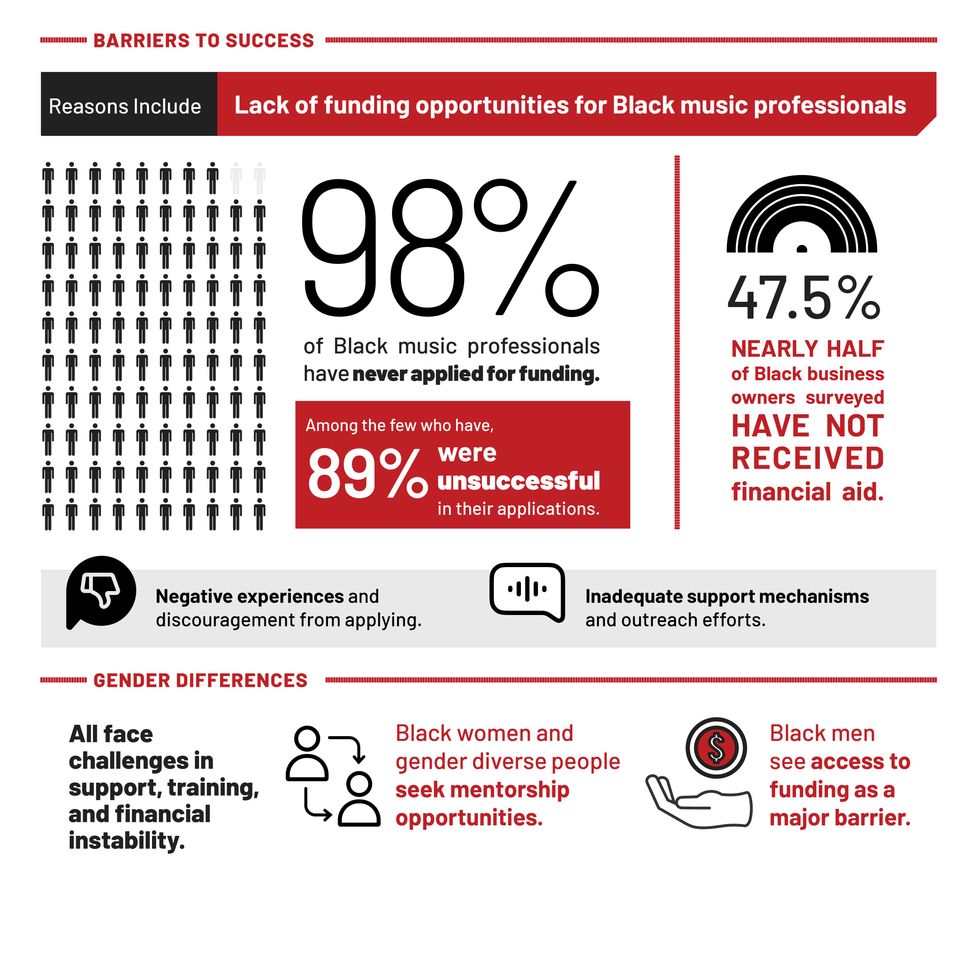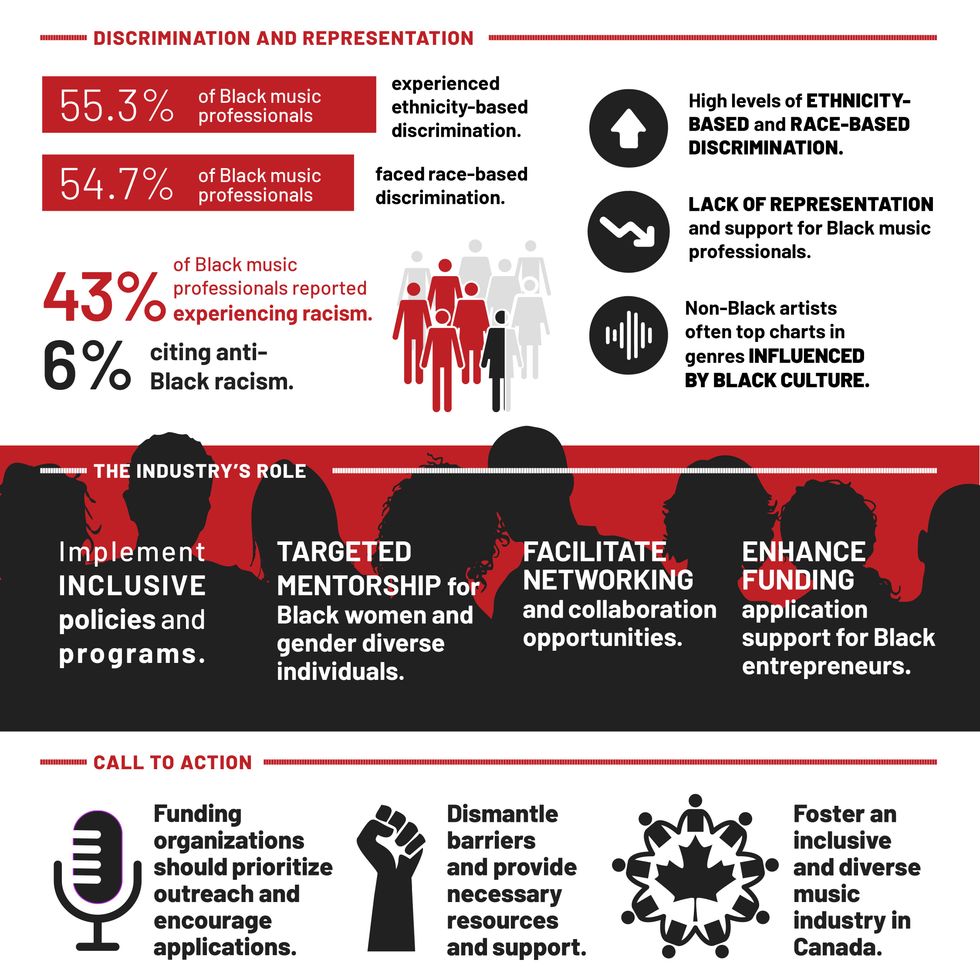New ADVANCE Report Examines The Value of Black Music in Canada
Industry Analysis & The Value of Black Music, a study undertaken by ADVANCE and Toronto Metropolitan University's Diversity Institute, shows both the cultural and economic impact of Black music and the systemic barriers that exist in the Canadian industry.
A new report is providing insight on the contributions of Black music in Canada — as well as the barriers Black artists and professionals face in the industry.
Industry Analysis & The Value of Black Music is a study undertaken by ADVANCE Canada's Black Music Business Collective and the Ted Rogers School of Management's Diversity Institute at Toronto Metropolitan University (TMU). It is co-written by Dr. Charlie Wall-Andrews, Dr. Wendy Cukier and Dr. Mohamed Elmi of TMU.
The report emphasizes the significant amount of value Black music brings to Canadian music, but also points out Black musicians and professionals continue to face underrepresentation, systemic racism and other roadblocks to success.
"This report came after many conversations that referenced obvious dichotomy between the impact of Black music in Canada, and the number of Black people working within the music industry," ADVANCE Executive Director Keziah Myers tells Billboard Canada.
The study's definition of Black music includes music created, produced or inspired by Black people, allowing it to take into account musicians who have leveraged Black culture in their music.
According to the report, Black music has accounted for a majority of streams (65%) of the top Canadian charts on Apple Music and Spotify between 2019 and 2022. Subscription streaming's value in 2022 was $521.79 million, the report notes, which means Black music adds up to approximately $339.16 million.
Yet, despite that value, Black musicians and members of the industry face discrimination and barriers.
Discrimination manifests in many different ways: heavy police presence at hip-hop concerts, underrepresentation of Black music on radio, and a Eurocentric approach to music education in school systems, among others.
One piece of the problem is an absence of research, particularly within the Canadian context. This study begins to fill in the gaps: researchers surveyed 1702 respondents about their experiences as Black artists and professionals in the Canadian music industry.
Here are some of the key findings:
A Lack of Funding and Mentorship
When asked what they needed to succeed in the industry, the number one answer was access to funding.
"Funding gaps exist at every level, particularly for Black women entrepreneurs, who struggle to secure loans or grants," says Myers.
When it comes to barriers to entering the industry, respondents identified financial instability as the number one issue. Of respondents who run their own business, nearly half (47.5%) said they hadn't received assistance in funding their business.
An overwhelming 98.4% of respondents said they had never applied for public or private grant funding. Given the wide range of grant bodies in Canada, from FACTOR to SOCAN Foundation to Canada Council, that number stands out as indicative of a system-level problem.
Myers points to programs focused on access equity for the Black community at bodies like the Municipality of Edmonton, Music Nova Scotia, Creative BC, Ontario Creates and the City of Toronto.
"Yet demand far outweighs supply," she says. "Addressing these disparities with dedicated financial support for Black-led projects and businesses is a step toward a more equitable industry."
The report also looks at FACTOR's breakdown of funded projects by genre, identifying that applications to Black music genres have frequently been less successful at receiving support compared to other genres. Hip-hop, in the five years examined (2017-2022), had a consistently lower funding approval rate for applications than the overall average.
Myers says ADVANCE has been highlighting the funding issue at every level of government , and hopes to find solutions that serve the community "and understand what support looks like to them."
"Targeted funding for Black music initiatives would align with the community’s cultural and economic contributions," she says.
Experiences of Discrimination and Belonging
The study also finds that 55.3% of respondents report experiencing discrimination based on ethnicity in the industry, while 54.7% report discrimination based on race.
Those rates, researchers note, are higher than what's reported among the Canadian Black population. Roughly 4 out of 10 individuals (42.1%) also responded that they were often the only person of their race or skin colour in a work environment.
At the same time, respondents reported high rates of a sense of belonging in the industry, and a strong majority (60.5%) felt that the music business is prioritizing diversity and inclusion.
Researchers note that these stats don't necessarily contradict each other.
As one participant wrote of their experiences: “I have been humiliated but it does not affect my love of music and love of the world.”
"Many of the issues in the music industry stem from institutionalized racism and the industry’s failure to support Black people at the executive level while simultaneously exploiting Black music," researchers write. Even when marginalized artists are well-represented, their managers are predominantly white and often men.
Next Steps and Looking Ahead
The report includes 12 recommendations for the industry. First among them is strategic development for Black music, which would include mentorship, training and artist development opportunities for Black artists and professionals.
Others include the creation of a race-based data collection framework to provide insights on Black music consumption; sponsorship programs targeting Black talent; diversity and inclusion within existing organizations; and the establishment of a Black Music National Taskforce to lead the industry on sustaining Black music in Canada.
In the last year, there's been positive steps for Black music in Canada: the launch of the Canada Black Music Archives' digital search provides a new resource for the history of Black music, while ADISQ added an R&B/soul category to its awards for the first time. A new CBC docuseries called Paid In Full also examines similar themes to the ADVANCE study, examining the history of Black exploitation in the music industry.
At the same time, the discourse around the Junos' initial plans to put the Reggae category on hiatus indicated work to be done when it comes to inclusion and representation. Industry Analysis & The Value of Black Music provides concrete steps on how the industry can move forward.
Read the full report here.





















 Simon GebrelulDiwang Valdez
Simon GebrelulDiwang Valdez Shai Gilgeous-AlexanderDiwang Valdez
Shai Gilgeous-AlexanderDiwang Valdez GIVĒONDiwang Valdez
GIVĒONDiwang Valdez